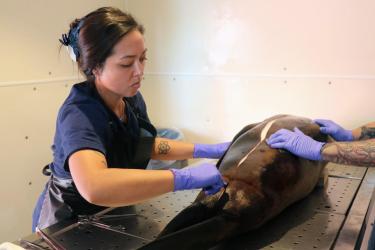Staff in the highly migratory species Fisheries Monitoring Program collaborate with partners at NOAA Fisheries’ West Coast Regional Office, Pacific States Marine Fisheries Commission, the state fisheries agencies of California, Oregon, and Washington, as well as other partners to transform fisheries data into fisheries information via summations and statistical analyses. This information helps support stock assessments, scientific studies, and national and international data reporting requirements for customers such as researchers, scientists, fisheries management staff, and Regional Fisheries Management Organizations. Additionally, the program seeks to modernize collection and management of highly migratory species biological, physical, and fisheries data through collaboration and the use of readily available technologies.
Fisheries Monitored by the Southwest Fisheries Science Center
- North Pacific Albacore Troll
- West Coast Large Mesh Drift Gillnet
- West Coast Harpoon
- Eastern Pacific Ocean Purse Seine
- California, Oregon, Washington Highly Migratory Species Sport
The basis for effectively collecting, managing and disseminating highly migratory species fisheries data is integrating these data from multiple sources that are often located in distant regions and managed by other programs. Our program maintains highly migratory species fisheries data in an enterprise Oracle database. These data are integrated with data maintained in other databases that are managed by our collaborators.
Regional Fisheries Management Organizations
There are three major Regional Fisheries Management Organizations and one bilateral treaty that the Fisheries Monitoring Program reports to on an annual and semi-annual basis to comply with the requirements of being a member country:
- The Inter-American Tropical Tuna Commission
- The Western and Central Pacific Fisheries Commission
- The International Scientific Committee for Tuna and Tuna-like Species in the North Pacific
- United States - Canada Albacore Treaty
U.S. catch and effort data for all Pacific fisheries are submitted to these Regional Fisheries Management Organizations to ensure international management goals are met for stocks of highly migratory species. The Pacific Fishery Management Council also uses data produced by the Fisheries Monitoring Program to generate the Stock Assessment and Fishery Evaluation report for highly migratory species off the U.S. West Coast.
RFMO fisheries data reports are classified into three general categories:
Category I - Annual catch and effort in units of metric tons and number of vessels, respectively
Category II - Summarized catch and effort grouped by month and 1-degree square for surface fisheries and by month and 5-degree square for longline fisheries
Category III - Summarized size composition data group at the same levels as Category II data
Current Pacific Fishery Statistical Reports
- Inter-American Tropical Tuna Commission Fishery Status Report
- Western and Central Pacific Fisheries Commission Tuna Fishery Yearbook
- Fisheries Statistics
- Data Inventory of International Scientific Committee for Tuna and Tuna-like Species in the North Pacific
Resources
Pacific Highly Migratory Species Logbook Forms
HMS SWFSC Data Request Form
Highly Migratory Species Management Plan
Please send all completed logbooks to the appropriate address listed below:
Eastern Pacific Ocean Purse Seine/ North Pacific Albacore Troll
Oregon/Washington Albacore CPFV
HMS Logbooks
National Marine Fisheries Service
8901 La Jolla Shores Drive
La Jolla, CA 92037-1022
Electronic Albacore
California CPFV/California Gillnet/Harpoon
HMS Logbooks
National Marine Fisheries Service
8901 La Jolla Shores Drive
La Jolla, CA 92037-1022



